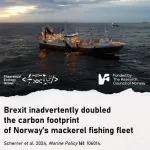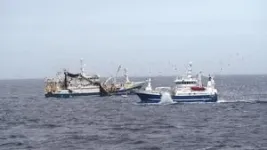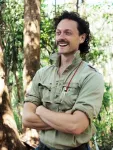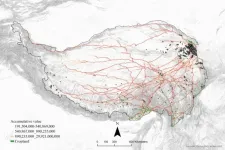Brexit-induced spatial restrictions reveal alarming increase of fishing fleet’s carbon footprint
Spatial restrictions after Brexit lead to doubling in carbon footprint of Norwegian mackerel fishing flee
2024-02-02
(Press-News.org)
In a study published today in Marine Policy, researchers have unveiled striking evidence that fisheries management decisions such as spatial fisheries restrictions can increase greenhouse gas emissions. The study, conducted by a team of scientists led by postdoctoral researcher Kim Scherrer at the University of Bergen, sheds light on the unforeseen consequences of policy changes on fishing fleets and their carbon footprint.
In the North Atlantic, international agreements often allow fleets to follow the fish across national borders. This allows fishers to catch the fish where it is most efficient. But when the UK left the EU (Brexit), Norway’s mackerel fishing fleet was suddenly excluded from fishing grounds in the UK. Using Brexit as a natural experiment, the researchers used open fisheries data to unravel the consequences for the Norwegian mackerel fishery. The findings reveal an alarming shift in the fishery's performance and carbon emissions due to the changes in fishing practices.
As the Norwegian fleet was excluded from UK fishing grounds, the vessels were forced to areas where fishing was less efficient. The catch per fishing trip nearly halved, prompting a doubling in the number of trips per vessel. Consequently, the fuel used per kilo of mackerel more than doubled.
Because of this change, an extra 23 million liters of fuel were needed each year, costing about €18 million more. This also released an extra 72,000 tonnes of CO2 into the air annually. The area restriction thus undid about 15 years of progress in fuel efficiency in Norway's pelagic fisheries.
”This small change in fisheries’ regulations unintentionally caused as much annual CO2 emissions as half a million within-EU return flights,” said Scherrer, emphasizing the necessity of considering emissions in fisheries management. “It is important that governments that have signed the Paris agreement avoid squandering emissions like this”.
The study underscores that policymakers and managers need to consider fuel efficiency trade-offs in marine spatial management, ensuring a balance between conservation efforts, other offshore industries, and reduced carbon footprints.
END
[Attachments] See images for this press release:


ELSE PRESS RELEASES FROM THIS DATE:
2024-02-02
University of Sydney researchers have shown it is possible to shield plants from the hungry maws of herbivorous mammals by fooling them with the smell of a variety they typically avoid.
Findings from the study published in Nature Ecology & Evolution show tree seedlings planted next to the decoy smell solution were 20 times less likely to be eaten by animals.
“This is equivalent to the seedlings being surrounded by actual plants that are unpalatable to the herbivore. In most cases it does trick the animals into leaving the plants alone,” said PhD student Patrick ...
2024-02-02
Do climate change deniers bend the facts to avoid having to modify their environmentally harmful behavior? Researchers from the University of Bonn and the Institute of Labor Economics (IZA) ran an online experiment involving 4,000 US adults, and found no evidence to support this idea. The authors of the study were themselves surprised by the results. Whether they are good or bad news for the fight against global heating remains to be seen. The study is being published in the journal Nature Climate Change. STRICTLY EMBARGOED: Do not publish before Friday, February 02, 11 a.m. CET!
A surprisingly large number of people ...
2024-02-02
Scientists from the German Cancer Research Center (DKFZ) and Heidelberg University investigated in mice how spreading tumor cells behave at the site of metastasis: Some tumor cells immediately start to form metastases. Others leave the blood vessel and may then enter a long period of dormancy. What determines which path the cancer cells take is their epigenetic status. This was also confirmed in experiments with human tumor cells. The results of the study could pave the way for novel diagnostic and therapeutic applications.
What makes cancer so dangerous? ...
2024-02-02
The 1 million-square-mile Tibetan Plateau — often called the “roof of the world” — is the highest landmass in the world, averaging 14,000 feet in altitude. Despite the extreme environment, humans have been permanent inhabitants there since prehistoric times.
Farming and herding play major roles in the economy of the Tibetan Plateau today — as they have throughout history. To make the most of a difficult environment, farmers, agropastoralists and mobile herders interact and move in conjunction with one another, which in turn shapes ...
2024-02-02
World Wetlands Day: Bogs hold an important key to the climate crisis
Peat bogs store twice as much CO2 as all of the world's forests combined. A new research center at the University of Copenhagen will map Earth’s wetlands and provide important knowledge about the greenhouse gas budgets of these areas. The Global Wetland Center will teach us how to contain carbon from plants and trees in bogs and other wetlands – and preserve it as well as the ancient bog bodies also found there.
He is world-renowned ...
2024-02-02
Researchers at the University of Auckland are running a trial of castor oil as a potential safe and natural treatment for dry-eye disease following a successful pilot study.
While exact figures aren’t available for New Zealand, in Australia, it is estimated dry-eye disease affects around 58 percent of the population aged over 50.
Advancing age, menopause, increased screen time, contact lens wear are just some of the risk factors for developing dry eye disease.
Blepharitis is the most common cause of dry-eye disease, accounting for more than 80 percent of cases. It is a chronic condition with no known cure.
“Currently, patients ...
2024-02-02
In a study recently published in the PNAS on Jan. 30, a research team led by Prof. CAO Xiaofeng from the Institute of Genetics and Developmental Biology of the Chinese Academy of Sciences, in collaboration with researchers from the Southern University of Science and Technology, reported a new understanding of how light affects plant growth.
Light plays a central role in plant growth and development, providing an energy source and governing various aspects of plant morphology. Post-transcriptional splicing (PTS) has been previously discovered to generate polyadenylated full-length transcripts. These transcripts, ...
2024-02-02
A group of patients with a hereditary disorder have had their lives transformed by a single treatment of a breakthrough gene-editing therapy, according to the lead researcher.
The patients from New Zealand, the Netherlands and the UK have hereditary angioedema, a genetic disorder characterised by severe, painful and unpredictable swelling attacks. These interfere with daily life and can affect airways and prove fatal.
Now researchers from the University of Auckland, Amsterdam University Medical Center and Cambridge University Hospitals have successfully treated more than ten patients with the CRISPR/Cas9 therapy, ...
2024-02-02
A molecule created at the University of Auckland is one step closer to becoming a treatment for an extremely rare and severely debilitating neurological disorder called Phelan-McDermid syndrome. Children with the disorder showed significant improvements in a phase two clinical trial in the US, Neuren Pharmaceuticals, which is listed on the Australian Securities Exchange, said in December.
Next steps would be a phase three trial and seeking approval from the US Food & Drug Administration. The molecule, NNZ-2591, comes from work years ago ...
2024-02-02
University of Queensland researchers have used machine learning to help predict the risk of secondary bacterial infections in hospitalised COVID-19 patients.
The machine learning technique can help detect whether antibiotic use is critical for patients with these infections.
Associate Professor Kirsty Short from the School of Chemistry and Molecular Biosciences said secondary bacterial infections can be extremely dangerous for those hospitalised with COVID-19.
“Estimates of the incidents of secondary bacterial infections in COVID-19 ...
LAST 30 PRESS RELEASES:
[Press-News.org] Brexit-induced spatial restrictions reveal alarming increase of fishing fleet’s carbon footprint
Spatial restrictions after Brexit lead to doubling in carbon footprint of Norwegian mackerel fishing flee




